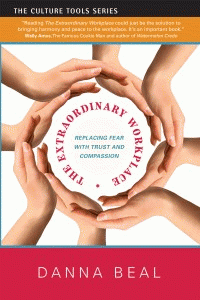(Article changed on February 23, 2013 at 05:53)
Extraordinary Workplace by Danna Beal
Job satisfaction plays a major part in our happiness.(1) According to a poll regarding satisfaction at work, the overall satisfaction that Americans get from their job has diminished. As reflected in a poll published through the Huffington Post:
The American economy might be recovering, but the Americans themselves aren't feeling the satisfaction.
A new poll released today by Gallup, based upon the Gallup-Healthways Well-Being Index, found that 87.5 percent of workers were content with their jobs in April. And while that's up from the low of 86.9 percent in July and August of last year, it remains below the peak reached in February 2008, when 89.4 percent of workers said they themselves were satisfied with their job.(2)
Job satisfaction oftentimes depends on the atmosphere of the job environment. One crucial driving factor to satisfaction is the empowerment of workers in the workplace. This factor also drives the overall feeling of devotion to a particular workplace on the part of employees. (2)
Danna Beal, author of The Extraordinary Workplace: Replacing Fear with Trust and Compassion (3) states that employees mimic the culture in which they work. Thus, if people are not getting along it doesn't matter how people are scripted. What happens within a workplace culture gets extended to customer, even if only on a subtle level through tone of voice, body language, or "bad vibes".
For example, in many situations concerning mental health case management services, there has been an increase of what's called "evidence based practices" in which case managers are often scripted in line with a particular theoretical foundation in terms of how they interact and work with clients. In addition, due to budget decreases in services, there is an add-on of productivity requirements in terms of both paperwork and billable hours which places much stress on the case managers and impacts the quality of their work. This results in pressure on the supervisors to place productivity demands on the case managers which again impacts the quality of services that people receive, creating a vicious cycle.
In combination with these drivers to employee satisfaction, the field is often entrenched in problems such as budget cuts which then effects job security while also leading to highly top-down approaches to supervising employees, who often have gone through years of training and experience in doing their job. Indeed, the field is saturated now with what's called "evidence based practices," which, in essence, increases the top-down fashion in which people are increasingly heavily supervised. This oftentimes pigeonholes the counselor in terms of what clients she serves. To keep the statistical "success" rate high, only those clients who fit the criteria defined by the service that holds the "patent" to the evidenced based practice are picked. Ultimately, evidenced based practice is simply another name for standardization, meaning the counselor and client are pigeonholed into a theoretical model that may or may not work for them.
This creates a vicious cycle which results in a disgruntled case manager serving clientele with high needs which then results in a lessening of the relationship counselor-client that is foundational for the work that is being done. It also increases the turnover rates of employees which is not positive for the overall atmosphere of the agency.
This is the result of a fear-based system whereby an agency is fearful of budget cuts in insurance on both government and private levels. This fear gets displaced onto the employees resulting in less quality of work due to a focus on increased quantity of billable hours and lessened quality of time spent. The primary driver to this problem goes all the way up to the government level with the ultimate driver being the influence of the top 1% that owns the politicians supposedly serving the people.
Indeed, this problem taps into the thrust towards privatization. In essence, like the prison settings, government is turning over the running of its various services, including mental health, which then results in less adequate care due to a focus on the "bottom line."
These are harsh conditions to foster a healthy work environment. Nor are these dynamics effective in cultivating positive mental health for case managers as well as their clientele. These working conditions need to be confronted, for they are not only detrimental to employees' morale and productivity, but the quality of service that she provides.
In line with this, Beal states that outstanding service begins in an extraordinary workplace culture where fear is replaced with trust and compassion. This begins with leadership. Leadership according to Beal is the honoring of the spirit in the people one is leading. What she says she often sees instead in the workplace is a web of egos battling for power that leads to reactions and counter-reactions.
According to Beal, what people want in a workplace is a trusting environment where people are not fearful of making mistakes or meeting quotas. They also want open communications where they are able to speak up without retaliation. They want to be respected for their achievements and experience and to be given guidance from supervisors who see themselves as being in service to the employees and clients alike.
One of the barriers in this author's opinion to the evolution of such a work place is our current economic and corporate environment. Our current emphasis on union busting and outsourcing of jobs to places like China beginning in the latter part of last century has taken its toll on worker's rights and benefits. Today, people in the working classes are hired at slave wages into unhealthy working conditions without union representation, which leads to hardships in trying to build effective and healthy microcosmic conditions in the workplace and macrocosmic relations with the public at large.
(Note: You can view every article as one long page if you sign up as an Advocate Member, or higher).




